 March 26, 2020 John E. Ross, KD8IDJ, Editor
| ||||||
ARRL Headquarters Closes, May QST Delivery is on Schedule ARRL Headquarters has closed, in compliance with an executive order from Connecticut Governor Ned Lamont that all non-essential businesses and not-for-profit entities reduce their in-person workforces by 100%. ARRL has equipped as many Headquarters staffers as possible to work offsite. "ARRL remains operational, while our teams work remotely to abide by Connecticut's Stay Home, Stay Safe policy, and most departments are maintaining business as usual," ARRL Interim CEO Barry Shelley, N1VXY, explained. "We are doing all we can under the circumstances and trying to maintain operations in as normal a way as possible." The print edition of the May issue of QST, now off the presses, will go ARRL also anticipates that The ARRL Letter, ARRL Audio News, the ARES E-Letter, The ARRL Contest Update, and the Eclectic Technology podcast will be available as usual. Although ARRL Headquarters closed, W1AW continues operating, but on a slightly altered transmission schedule. Morning code practice and qualifying run transmissions have been suspended; evening transmissions, including qualifying runs, will go on as usual. W1AW remains closed to the public, however. Operations at the ARRL Volunteer Examiner Coordinator (VEC) will also continue, and the best way to receive a timely response is via email, as call volume has been heavy. The ARRL warehouse is working with a reduced staff, so orders will be delayed, and ARRL will not be able to respond to expedited shipping orders. Members should direct questions to ARRL via email. "Thank you for your patience during this time of adjustment," Shelley said. Ham Radio Clubs Connect Amid Social Distancing As college campuses have sent students home to finish their classes online, members of the K7UAZ Amateur Radio Club in Tucson -- a student organization at the University of Arizona -- have moved their radio club meetings to the radio. K7UAZ Station Manager Curt Laumann, K7ZOO, said that when the university largely shuttered its campus, club President Ken Gourley, KM6BKU, immediately transitioned regular meetings to an on-the-air format using the university repeater. The club was already holding a weekly net on Monday nights, but the added on-air club meetings offer another opportunity to get on the radio. In recent months, in-person K7UAZ club meetings have hosted ARRL staff member Bob Inderbitzen, NQ1R, who liaises for the ARRL Collegiate Amateur Radio Initiative (CARI), underscores the importance that all radio clubs encourage on-the-air activity in this challenging time. "While I know many businesses and schools have moved to online meetings and learning, I can think of many advantages for a radio club to move club meetings to on-air," Inderbitzen said. His list includes:
At K7UAZ, experienced club members provide instruction for members to access the K7UAZ ARC repeater from 2 meters and via EchoLink. The club also offers members the opportunity to borrow handheld radios or to be patched in via HF or videoconferencing, if they live too far away from the repeater. ARRL is encouraging university radio clubs to network with other clubs and students via ARRL's CARI Facebook group. "Keeping our campus radio clubs going will ensure we are, together, advancing the art, science, and enjoyment of amateur radio. It's our collective mission," Inderbitzen said. Radio Amateurs Team Up to Help University Design Low-Cost Ventilator Amateur radio volunteers from around the world have volunteered to assist University of Florida Professor Sam Lampotang and his engineering team in their quest to rapidly develop an open-source, low-cost patient ventilator that can be built anywhere from such The amateur radio volunteers are developing Arduino-based control software that will set the respiratory rate and other key parameters in treating critically ill coronavirus victims. Multiple volunteers responding to a call for help from Gordon Gibby, MD, KX4Z, include noted software developer Jack Purdum, W8TEE, and uBITX transceiver maker Ashhar Farhan, VU2ESE. University of Florida physicians are working to address the critical legal aspects as the design moves closer to fruition. The ventilator's valves would precisely time compressed oxygen flow into patient breathing circuits under Arduino control, allowing exhausted patients with "stiff" lungs impacted by viral pneumonia to survive until their body can clear the infection. The software design team is also adding simple features such as an LCD display, encoders to choose parameters, and watchdog safety features. ARRL Podcasts Schedule
Both podcasts are available on iTunes (iOS) and Stitcher (Android) as well as on Blubrry -- On the Air | Eclectic Tech. International Amateur Radio Union Adjusting to COVID-19 The International Amateur Radio Union (IARU) has reported on how it's addressing the COVID-19 pandemic, given the various restrictions in place to slow the spread of the virus. IARU said the International Telecommunication Union (ITU) Headquarters in Geneva remains off limits to visitors until April 17 at the earliest. ITU has cancelled some meetings, postponed others, and converted others into online While Dayton Hamvention has canceled its 2020 show, Europe's largest amateur radio gathering, HAM RADIO in Friedrichshafen, Germany, is still on schedule for June 26â-â28. IARU Region 2 Emergency Communications and Satellite Communications workshops set for May 30 - 31 in Trinidad and Tobago will now be held online. IARU reports that interest and registrations have surged since the announcement. These workshops will be held in English, but preparations are under way for workshops in Spanish to be held later. IARU Region 3 has canceled its first Youngsters on the Air (YOTA) Camp that had been planned for early October in Rayong, Thailand. World Amateur Radio Day on April 18 this year celebrates the 95th anniversary of the IARU's founding. IARU has allowed that amateur radio "is the best way to practice social distancing." IARU Region 1 (Europe, the Middle East, and Africa) has asked member-societies to "reconsider their position" on Field Day events over the next few months. "Field Days bring radio amateurs together and, therefore, represent an environment where social distancing is difficult to achieve," IARU Region 1 President Don Beattie, G3BJ, said. "We must recognize that many radio amateurs are in the older, higher-risk age groups." IARU will not sponsor the Region 1 HF CW Field Day in June but said national societies have to make their own decisions as to whether their Field Day events will go forward. Beattie said single-operator contests "remain a great way for those forced to stay at home to enjoy the magic of amateur radio." The K7RA Solar Update Tad Cook, K7RA, Seattle, reports: We saw another week with no sunspots, which were last seen just briefly more than 2 weeks ago on March 8 - 9. Spaceweather.com reports that, so far in 2020, the percentage of days without sunspots (76%) is about the same as all of 2019, when it was 77%. Average daily solar flux inched up from 70.1 to 71.1. Geomagnetic indicators remain quiet, with average planetary A index at 7.7, a little Predicted solar flux for the next 45 days is 71 on March 26 - April 2; 70 on April 3 - 4; 72 on April 5 - 18; 70 on April 19 - May 1, and 72 on May 2 - 9. Predicted planetary A index is 5 on March 26 - 29; 12 on March 30 - 31; 8 on April 1; 5 on April 2 - 5; 10 and 8 on April 6 - 7; 5 on April 8 - 13; 8, 12, and 8 on April 14 - 16; 5 on April 17 - 22; 12 and 8 on April 23 - 24; 5 on April 25 - May 2; 10 and 8 on May 3 - 4, and 5 on May 5 - 9. Sunspot numbers for March 19 - 25 were 0, 0, 0, 0, 0, 0, and 0, with a mean of 0. The 10.7-centimeter flux was 72.1, 71.7, 70.8, 70.2, 70.4, 71.2, and 71.2, with a mean of 71.1. Estimated planetary A indices were 12, 7, 8, 7, 12, 4, and 4, with a mean of 7.7. Middle latitude A index was 7, 5, 5, 7, 10, 4, and 3, with a mean of 5.9. A comprehensive K7RA Solar Update is posted Fridays on the ARRL website. For more information concerning radio propagation, visit the ARRL Technical Information Service, read "What the Numbers Mean...," and check out K9LA's Propagation Page. A propagation bulletin archive is available. Monthly charts offer propagation projections between the US and a dozen DX locations. Share your reports and observations. Just Ahead in Radiosport See the ARRL Contest Calendar for more information. For in-depth reporting on amateur radio contesting, subscribe to The ARRL Contest Update via your ARRL member profile email preferences.
Major Florida Emergency Communication Conference and Exercise are a Major Success Radio amateurs and communications professionals from several states convened over the February 29 - March 1 weekend in Gainesville, Florida, for a training conference and exercise to test new skills learned along with basic radio communication skills and protocols. The Alachua County Emergency Manager and staff served as exercise evaluators. Former FEMA Administrator Craig Fugate, KK4INZ, also attended and served as an exercise player on Sunday. The weekend's programs and exercise were developed by Gordon Gibby, KX4Z, who also conducted the optional ARRL EC-001 Introduction to Emergency Communications course on Friday. "Overall, the exercise was positively reviewed by both the participants and the professional evaluators," reported Rick Palm, K1CE, who edits the ARES E-Letter and took part in the activity. "For the participants, a few of the more-challenging objectives were documentation on the ICS forms, and establishing HF voice/Winlink connections, which were "More easily accomplished was setting up radio equipment, using VHF packet, and addressing the issues presented [by the exercise moderators]. Group relationships were dynamic and positive. Units were able to check into the command net with little difficulty," Palm added. The conference featured a basic track for individuals needing basic or advanced skill improvement, and a leadership track for ARES® leaders who need to design and execute exercises while growing local groups. The day kicked off with a review of amateur radio disaster response, with discussion focused on service to main stakeholders, including government agencies, NGOs, and disaster survivors. Topics covered the importance of communications when "lives are really at stake" and the value of exercises. Good weather prevailed for the Sunday exercise with a large and enthusiastic group of radio amateurs on hand to put lessons learned the previous day into practice by playing out the Homeland Security Exercise and Evaluation Program (HSEEP)-compliant exercise dubbed
2020 Hot & Cold. The scenario was a malfunction of high-pressure natural gas pipelines with telecommunications failures. Resources required included VHF/UHF/HF voice and digital equipment and capabilities; the Winlink system, and the NTS/RRI networks. The Incident Command post and shelters for area residents were staffed and set up with both long-haul, regional, and local radio communication capabilities. The overall exercise mission was "response." Players worked to meet several objectives, which included joining the command net, using alternative antennas (such as a long wire to replace a Yagi), employing emergency power sources and alternatives in the event of failures, checking into an HF voice net for message handling, using Winlink to access gateways and make connections, practicing voice net control procedures, drafting ICS-213 message forms and transmitting, receiving, and relaying messages, composing and transmitting situation reports to the Incident Command Post via the command net, and completing required documentation. Participant surveys indicated that those taking part felt that the best features of the exercise were testing equipment, learning how to complete the ICS forms, having the ICS-205 frequency plan ahead of the exercise, antennas, and power source testing. Surveys and comments indicated that some participants wished they had studied the exercise plan missions and objectives more in advance; understood the forms they had access to better in Winlink; were more familiar with Winlink, local frequencies, and digital modes in general; tested their equipment before leaving home, and had advance practice with the packet mode. "[These are] all good learning opportunities that will result in greater efficiency in next year's exercise, and, of course, the real thing, should that occur," Palm said. Long Island CW Club Offering Free Online Code Instruction for Homebound Youngsters The Long Island CW Club in New York is offering free online Morse code instruction for the "many youngsters at loose ends as a result of school closings due to COVID-19 concerns." The club's co-founder, Ongoing classes will take place Monday through Friday, specifically for school-agers anywhere across the country or overseas, via Zoom online video conferencing. A computer equipped with a microphone and camera is required. Classes for elementary schoolers run 30 minutes starting at 1600 UTC, followed by 45-minute classes for middle- and high school-aged students, starting at 1645 UTC. Parental permission is required through advance registration. Contact class instructor Rob Zarges, K2MZ, by e-mail or call 508-831-8248. -- Thanks to Mel Granick, KS2G, ARRL New York City-Long Island Section Public Information Coordinator Tower-Mounted Christmas Lights Cheer California Neighborhood According to media reports, some Southern California residents have been turning their Christmas lights back on to bolster the mood of the neighborhood during the coronavirus pandemic. "That caught my eye," Chip Margelli, K7JA, of Garden Grove, told Because of knee replacement surgery last December, Margelli had not yet taken down his Christmas lights, so he re-lit them and put an announcement on the local Neighborhood Watch Facebook page. Margelli said a lot of positive comments indicated his neighbors would follow suit. "So, hams everywhere can use amateur radio to do something to increase the cheer factor in their neighborhoods, even though it's not over the air," Margelli suggested. "Spreading goodwill like this can surely only improve our image in the community." -- Thanks to Chip Margelli, K7JA In Brief...
Upcoming ARRL Section, State, and Division Conventions Note: Many conventions and hamfests have been canceled or postponed due to the coronavirus pandemic. Check the calendar of canceled events on the ARRL website.
Find conventions and hamfests in your area.
. .
Subscribe to...
Free of charge to ARRL members...
| ||||||
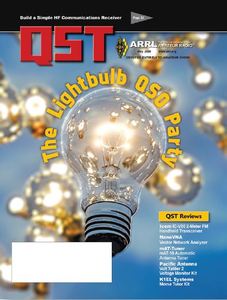 out in the mail next week, and the US Postal Service anticipates no delivery disruptions. Digital QST and the pending digital debuts of QEX and NCJ are expected to be posted on schedule. The May issue of QST will include more details on the QEX and NCJ digital editions -- a new member benefit -- as well as an intriguing cover article on "The Lightbulb QSO Party."
out in the mail next week, and the US Postal Service anticipates no delivery disruptions. Digital QST and the pending digital debuts of QEX and NCJ are expected to be posted on schedule. The May issue of QST will include more details on the QEX and NCJ digital editions -- a new member benefit -- as well as an intriguing cover article on "The Lightbulb QSO Party."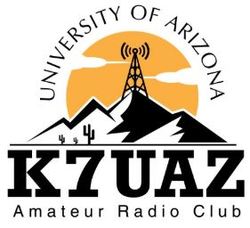 presentations on such topics as EME (Earth-moon-Earth) communication and an AMSAT CubeSat simulation. As meetings move on the air, Gourley explained, he will send out a copy of meeting presentation slides so members can follow along. "I will lead the net and start with check-ins," he said. "We will work our way through the slides, discussing previous events, upcoming activities, the treasurer's report, projects, etc. I will take new check-ins every 5 - 10 minutes. We will conclude with officer comments and general comments. Hopefully it won't take more than 30 - 45 minutes."
presentations on such topics as EME (Earth-moon-Earth) communication and an AMSAT CubeSat simulation. As meetings move on the air, Gourley explained, he will send out a copy of meeting presentation slides so members can follow along. "I will lead the net and start with check-ins," he said. "We will work our way through the slides, discussing previous events, upcoming activities, the treasurer's report, projects, etc. I will take new check-ins every 5 - 10 minutes. We will conclude with officer comments and general comments. Hopefully it won't take more than 30 - 45 minutes.".jpg) As online fatigue and a feeling of isolation will inevitably creep into our "new normal," being on-air will introduce variety into our communication practices. As many of us are now homebound working or studying, turning on a radio to connect with your ham radio peers will be welcome respite!
As online fatigue and a feeling of isolation will inevitably creep into our "new normal," being on-air will introduce variety into our communication practices. As many of us are now homebound working or studying, turning on a radio to connect with your ham radio peers will be welcome respite!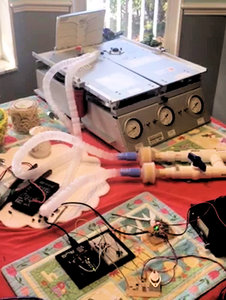 commonly available components as PVC pipe and lawn-sprinkler valves.
commonly available components as PVC pipe and lawn-sprinkler valves.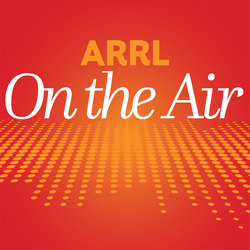 The latest (March 12) episode of the On the Air podcast focuses on how to calculate feed line loss, real-world examples of how digital and analog FM transceivers handle weak signals, and an interview with Rob Macedo, KD1CY, Eastern Massachusetts ARES Section Emergency Coordinator and SKYWARN Coordinator for the National Weather Service Boston/Norton office. Rob offers information about how hams can get involved with SKYWARN.
The latest (March 12) episode of the On the Air podcast focuses on how to calculate feed line loss, real-world examples of how digital and analog FM transceivers handle weak signals, and an interview with Rob Macedo, KD1CY, Eastern Massachusetts ARES Section Emergency Coordinator and SKYWARN Coordinator for the National Weather Service Boston/Norton office. Rob offers information about how hams can get involved with SKYWARN.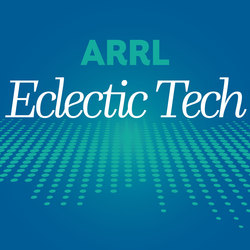 The latest episode of the Eclectic Tech podcast (Episode 4) includes an interview with Eric Knight, KB1EHE, updating the RF-based Alzheimer's therapy featured in QST, and an interview with Robert Dixon, W8ERD, about the "Wow!" signal and SETI. Dixon was the Big Ear project director when the Wow! signal was received.
The latest episode of the Eclectic Tech podcast (Episode 4) includes an interview with Eric Knight, KB1EHE, updating the RF-based Alzheimer's therapy featured in QST, and an interview with Robert Dixon, W8ERD, about the "Wow!" signal and SETI. Dixon was the Big Ear project director when the Wow! signal was received.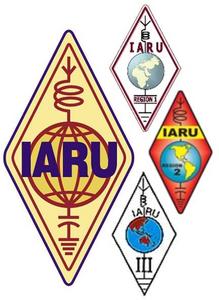 gatherings. IARU representatives are adjusting plans accordingly and following a similar pattern.
gatherings. IARU representatives are adjusting plans accordingly and following a similar pattern. higher than the previous week's 5.9 average. Average mid-latitude A index was also 5.9, up from 4.1 last week.
higher than the previous week's 5.9 average. Average mid-latitude A index was also 5.9, up from 4.1 last week.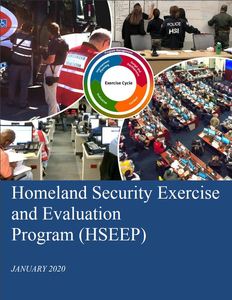 ultimately achieved successfully," he recounted. "Some participants were unclear on some procedures and instructions. Set-up and getting HF antennas erected resulted in delay, leaving some message traffic backed up." These stumbling blocks were discussed in an after-exercise debriefing, Palm said.
ultimately achieved successfully," he recounted. "Some participants were unclear on some procedures and instructions. Set-up and getting HF antennas erected resulted in delay, leaving some message traffic backed up." These stumbling blocks were discussed in an after-exercise debriefing, Palm said.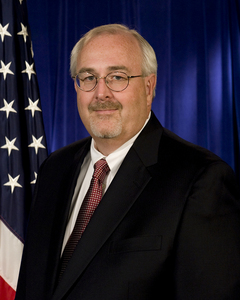
 Howard Bernstein, WB2UZE, pointed out that learning Morse code is "a fun and educational activity for children of all ages that can fill part of the gap left by the current unfortunate situation that has closed so many schools across the country."
Howard Bernstein, WB2UZE, pointed out that learning Morse code is "a fun and educational activity for children of all ages that can fill part of the gap left by the current unfortunate situation that has closed so many schools across the country."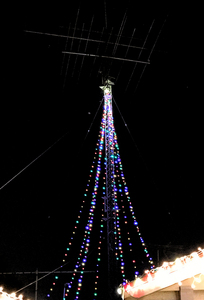 ARRL. "Every year, I put lights up on my 70-foot fixed tower, turning it into the tallest Christmas tree in Garden Grove; it is quite a beacon in the neighborhood."
ARRL. "Every year, I put lights up on my 70-foot fixed tower, turning it into the tallest Christmas tree in Garden Grove; it is quite a beacon in the neighborhood." Refunds are available for canceled Dayton Hamvention-associated social events. These include
Refunds are available for canceled Dayton Hamvention-associated social events. These include 
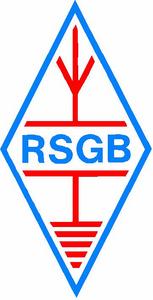 The Radio Society of Great Britain (
The Radio Society of Great Britain (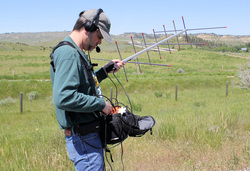 Sean Kutzko, KX9X, is AMSAT's new Volunteer Coordinator. AMSAT President Clayton Coleman, W5PFG, announced the appointment this week. Licensed since 1982, Kutzko served for 10 years on the ARRL Headquarters staff as Contest Branch Manager and as Media and Public Relations Manager. "It's an honor to be able to volunteer for AMSAT," Kutzko said. "AMSAT is a great organization and helping find good volunteers who are willing to help all areas of AMSAT's growth and development is the least I could do for the organization that has given me a lot of enjoyment and technical skill." An active HF and VHF contester, DXer, and backpack QRP enthusiast, Kutzko started working satellites in 2011. He's written instructional articles on satellite operating for the AMSAT website and for QST, and he blogs regularly on satellite topics on DX Engineering's On All Bands. -- Thanks to AMSAT News Service
Sean Kutzko, KX9X, is AMSAT's new Volunteer Coordinator. AMSAT President Clayton Coleman, W5PFG, announced the appointment this week. Licensed since 1982, Kutzko served for 10 years on the ARRL Headquarters staff as Contest Branch Manager and as Media and Public Relations Manager. "It's an honor to be able to volunteer for AMSAT," Kutzko said. "AMSAT is a great organization and helping find good volunteers who are willing to help all areas of AMSAT's growth and development is the least I could do for the organization that has given me a lot of enjoyment and technical skill." An active HF and VHF contester, DXer, and backpack QRP enthusiast, Kutzko started working satellites in 2011. He's written instructional articles on satellite operating for the AMSAT website and for QST, and he blogs regularly on satellite topics on DX Engineering's On All Bands. -- Thanks to AMSAT News Service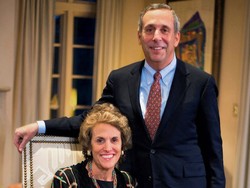 Harvard University President Lawrence Bacow, KA1FZQ, and his wife Adele have tested positive for COVID-19. "We started experiencing symptoms on Sunday -- first coughs, then fevers, chills, and muscle aches -- and contacted our doctors on Monday," Bacow related in a March 10 message to the Harvard University community. "We were tested yesterday and just received the results a few minutes ago. We wanted to share this news with all of you as soon as possible." Bacow said neither he nor his wife knows how they contracted the virus and have been working from home and limiting contact with others. "This virus can lay anyone low," Bacow added. "We all need to be vigilant and keep following guidelines to limit our contact with others."
Harvard University President Lawrence Bacow, KA1FZQ, and his wife Adele have tested positive for COVID-19. "We started experiencing symptoms on Sunday -- first coughs, then fevers, chills, and muscle aches -- and contacted our doctors on Monday," Bacow related in a March 10 message to the Harvard University community. "We were tested yesterday and just received the results a few minutes ago. We wanted to share this news with all of you as soon as possible." Bacow said neither he nor his wife knows how they contracted the virus and have been working from home and limiting contact with others. "This virus can lay anyone low," Bacow added. "We all need to be vigilant and keep following guidelines to limit our contact with others."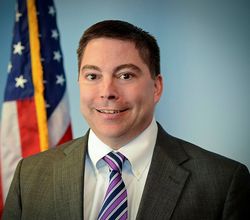 President Donald Trump has nominated FCC Commissioner Michael O'Rielly for another 5-year term on the Commission. The nomination was sent to the US Senate on March 18. O'Rielly was initially appointed to the FCC in 2013 by President Barack Obama. "During my tenure at the Commission, I have advocated for preserving and advancing American free market principles to develop common sense regulation and eliminate unnecessary rules that hurt consumers," O'Rielly said in a statement, expressing appreciation to President Trump. If the Senate confirms O'Rielly's nomination, the new term would date retroactively to last July and end in 2024.
President Donald Trump has nominated FCC Commissioner Michael O'Rielly for another 5-year term on the Commission. The nomination was sent to the US Senate on March 18. O'Rielly was initially appointed to the FCC in 2013 by President Barack Obama. "During my tenure at the Commission, I have advocated for preserving and advancing American free market principles to develop common sense regulation and eliminate unnecessary rules that hurt consumers," O'Rielly said in a statement, expressing appreciation to President Trump. If the Senate confirms O'Rielly's nomination, the new term would date retroactively to last July and end in 2024..jpg) The FCC will hold its March 31 open meeting by teleconference. "Due to the current COVID-19 pandemic and related agency telework and headquarters access policies, this meeting will be in a wholly electronic format and will be open to the public on the internet via
The FCC will hold its March 31 open meeting by teleconference. "Due to the current COVID-19 pandemic and related agency telework and headquarters access policies, this meeting will be in a wholly electronic format and will be open to the public on the internet via 







